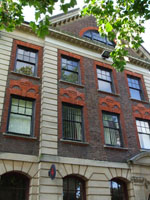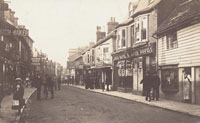
Part 3: Early working days - Apprenticed to ‘the three branch’ trade
Before I achieved “part timer” status at school in 1885, I had a
job at the office of the local paper, Horsham Advertiser”, now West
Sussex County Times, to help on the hand-operated cylinder machine
on which the papers were printed. The “feeding” and “taking off”,
as well as folding, was done by hand and two hefty men turned the
machine. In time I became proficient in “taking off” and was
allowed to “feed”. All hands were put on “folding”. I also learnt
to work on antiquated hand pieces, very like in detail the picture
of the first press set up by Caxton. This was used for “galley
proofs” and what Harry Cheverton[1],
the foreman, called “Winkle Bag” printing, really cheap jobbing
work. I learnt the “boxes" in upper and lower case and was able to
“dis” i.e. discompose a stick of type, slowly.
Mr Cheverton asked me if I would like to be apprenticed to a
printer when old enough? I jumped at the offer and was told I must
have an eye test by a doctor. Meantime, not being old enough to be
apprenticed, I was allowed to carry on as “the boy” on Friday
evenings from 5 to 10 in the Printing Office – it was never called
Workshop – and on Saturday I had a round to deliver. Later on I
visited old W. Thomas in his surgery in London Road. He turned me
down flat on account of defective vision. This was the first time I
was aware of this defect which was to play an important part in my
later life.
Another job I had as a “part timer” was Post Boy. I had to report
at Post Office every morning at 6 a.m., sort my letters and deliver
on a small round: Chesworth Farm, Amies Mill, Bourne Hill, Denne
Park House, and sundry cottages. I could usually do this in time to
go home for breakfast and be at school by 9 a.m. or soon
after.
About November 1886 I got an evening job as second marker in the
billiards room at the Horsham Club – hours 6 to 10 in theory, 6 to
11 in practice.
 Horsham Club 2008
Horsham Club 2008
It was not without its interest; the members then were of the
smaller gentry, lawyers and doctors. At times we were busy, at
others not much to do till 8 or 9 o’clock. I was taught to play
billiards and play properly but I was such a little kid that the
men hardly liked playing with me preferring Jack Whittington, a
fine upstanding man to look at, but the worst possible type for a
raw boy to be associated with. He was, in fact, a typical
professional billiard marker.
I have at times wondered how I managed to start work at 6 and go on
to 10 or 11, but at the time I was not conscious of being hard done
by. I think I rather liked the full life as a Postman, School boy
and Billiard Marker and I was earning 6/- per week.
Shortly after I left school in 1887 the Postmaster arranged for a
second delivery on my round, increasing the pay from 3/- to 5/- per
week with time in the afternoon for any odd job that could be
picked up and they were many and various. This, with my job at the
club brought my total earnings to 8/- per week, and often 2/- to
2/6 more, quite a considerable sum in those days for a boy of
14/15.
When I had just turned my 15th birthday, my father and mother were
very anxious about my future. I had rather a strong wish to become
a school teacher. There was no opportunity of training for that.
Had I been attending the usual Board School this might have been
arranged. My Mother in her early youth had some experience as a
“pupil teacher”. She considered that the unconventional system, or
lack of system, that obtained at the Free School had unfitted me
for the dull routine of the Board School and so, after another
period of waiting for something to turn up, Messrs Sendall of East
Street Horsham, having a vacancy for an apprentice, took me on. I
had not the slightest sense of vocation. Had the vacancy for
apprenticeship been to a butcher, baker or candlestick maker, I
dare say I would have fallen into it with equal enthusiasm. The
great idea was to have a trade of some sort.
 East Street, Horsham c. 1904,
Reproduced with permission from West Sussex Past Pictures,
Ref:PP/WSL/PC004786; West Sussex County Council Library
Service;
East Street, Horsham c. 1904,
Reproduced with permission from West Sussex Past Pictures,
Ref:PP/WSL/PC004786; West Sussex County Council Library
Service;
Image credit.
After a probationary period I was duly apprenticed to Plumbing,
Painting and Glazing, what was known in the trade as a “three
branch hand”. These three branch hands were most useful men
on a jobbing firm. As a rule they were indifferent craftsmen who
could turn their hand to almost anything. How my parents managed
with my drop in earnings I just do not know. I was earning 8/- per
week, often 10/-, as postboy, billiard marker etc. and now at 15
years old, a hungry growing lad, my wages were to be 1/- per week
first year, 2/6, 4/-, 5/- and 7/6 in fifth year.
I look back upon this apprenticeship with very mixed feelings. I
was usually interested and happy, but my master never once took the
slightest pains to teach me anything or see that someone else did.
It was in fact a serious swindle and fraud. I was not aware of how
serious it was at the time for I liked most things I was doing.
What happened to a boy was he did all manner of odd jobs till it
was discovered he did a certain job very well. He was then kept at
that. For example, the firm had a large stock of paperhanging, made
their own pattern book, also coffin making, undertakers oddments
etc. Undertakers and little jobbing men over a wide radius dealt
with them in what was a very lucrative business. Both stocks were
often kept untidily and one day towards the end of my first year I
was sent into the stockroom to “tidy up”. It was winter time, it
was a job in a warm room, nobody to worry me, so on my own
initiative I set about rearranging and listing the stock in both
rooms. On the second day the boss came up to enquire if I had gone
to sleep! When he saw what I had done and was doing, he called in
his brother. They had a confab as to whether they could trust me
with invoice files, to complete the work I had started on stock
sheets, decided to do so having extracted a promise from me that I
neither showed the sheets to any of the men or customers. I felt
mightily important, worked early and late, made new racks as
needed, priced everything from invoices at cost in cipher – the
code used was B1y2
h3a4r5m6
w7e8
l9i10v11e12 – scrapped
my original stock sheets and made an indexed stock book. The work
took weeks. On completion, the boss gave me 6d and asked would I
like to look after the stock. I jumped at it, kept the stock and
served it to customers for over two years of my five as three
branch hand, at the same time acting as “dispenser” in the cellar
used as a paint store and shop, where all paint used by the firm
was “knocked up” by hand in earthenware pots, stained and strained
and sent to respective jobs. It is hard to believe now (c.1958)
that no readymade paint or distemper was ever used, that most
stainers were bought in dry state, ground by hand on a marble slab
and M?ller. I have gone home after a day of grinding yellow chrome
looking like a canary and make a pail of jellied distemper second
to none. How I escaped Plumbism or Painters’ Colic beats me, for
there was no provision for washing, and no one told a boy of the
potential danger of white or red lead!
- [1] John Cheverton, printer and publisher, lived with his
family at 28 Carfax, Horsham (1881 English Census).
Share this
page (third party services may set cookies)